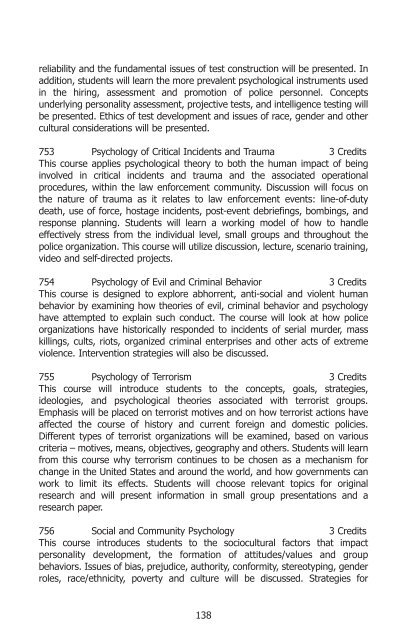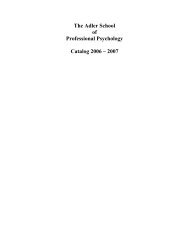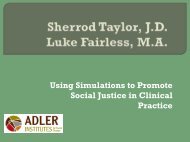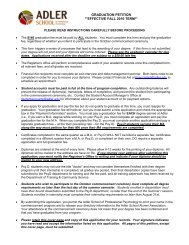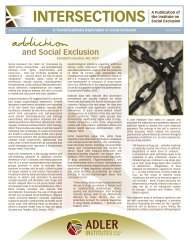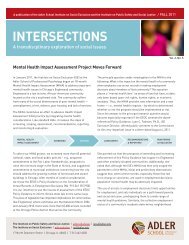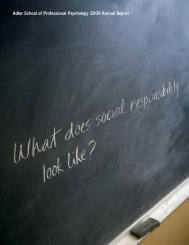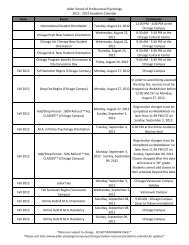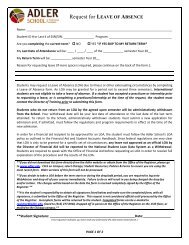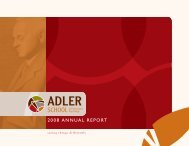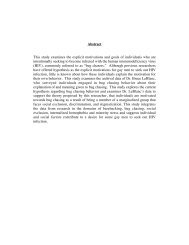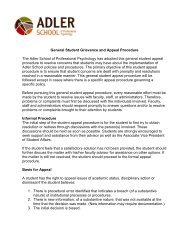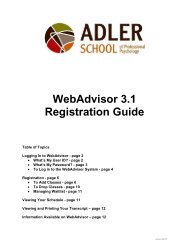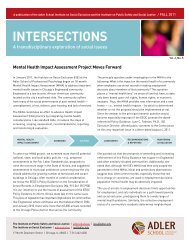Adler School of Professional Psychology Catalog 2008 – 2009
Adler School of Professional Psychology Catalog 2008 – 2009
Adler School of Professional Psychology Catalog 2008 – 2009
Create successful ePaper yourself
Turn your PDF publications into a flip-book with our unique Google optimized e-Paper software.
eliability and the fundamental issues <strong>of</strong> test construction will be presented. In<br />
addition, students will learn the more prevalent psychological instruments used<br />
in the hiring, assessment and promotion <strong>of</strong> police personnel. Concepts<br />
underlying personality assessment, projective tests, and intelligence testing will<br />
be presented. Ethics <strong>of</strong> test development and issues <strong>of</strong> race, gender and other<br />
cultural considerations will be presented.<br />
753 <strong>Psychology</strong> <strong>of</strong> Critical Incidents and Trauma 3 Credits<br />
This course applies psychological theory to both the human impact <strong>of</strong> being<br />
involved in critical incidents and trauma and the associated operational<br />
procedures, within the law enforcement community. Discussion will focus on<br />
the nature <strong>of</strong> trauma as it relates to law enforcement events: line-<strong>of</strong>-duty<br />
death, use <strong>of</strong> force, hostage incidents, post-event debriefings, bombings, and<br />
response planning. Students will learn a working model <strong>of</strong> how to handle<br />
effectively stress from the individual level, small groups and throughout the<br />
police organization. This course will utilize discussion, lecture, scenario training,<br />
video and self-directed projects.<br />
754 <strong>Psychology</strong> <strong>of</strong> Evil and Criminal Behavior 3 Credits<br />
This course is designed to explore abhorrent, anti-social and violent human<br />
behavior by examining how theories <strong>of</strong> evil, criminal behavior and psychology<br />
have attempted to explain such conduct. The course will look at how police<br />
organizations have historically responded to incidents <strong>of</strong> serial murder, mass<br />
killings, cults, riots, organized criminal enterprises and other acts <strong>of</strong> extreme<br />
violence. Intervention strategies will also be discussed.<br />
755 <strong>Psychology</strong> <strong>of</strong> Terrorism 3 Credits<br />
This course will introduce students to the concepts, goals, strategies,<br />
ideologies, and psychological theories associated with terrorist groups.<br />
Emphasis will be placed on terrorist motives and on how terrorist actions have<br />
affected the course <strong>of</strong> history and current foreign and domestic policies.<br />
Different types <strong>of</strong> terrorist organizations will be examined, based on various<br />
criteria – motives, means, objectives, geography and others. Students will learn<br />
from this course why terrorism continues to be chosen as a mechanism for<br />
change in the United States and around the world, and how governments can<br />
work to limit its effects. Students will choose relevant topics for original<br />
research and will present information in small group presentations and a<br />
research paper.<br />
756 Social and Community <strong>Psychology</strong> 3 Credits<br />
This course introduces students to the sociocultural factors that impact<br />
personality development, the formation <strong>of</strong> attitudes/values and group<br />
behaviors. Issues <strong>of</strong> bias, prejudice, authority, conformity, stereotyping, gender<br />
roles, race/ethnicity, poverty and culture will be discussed. Strategies for<br />
138


